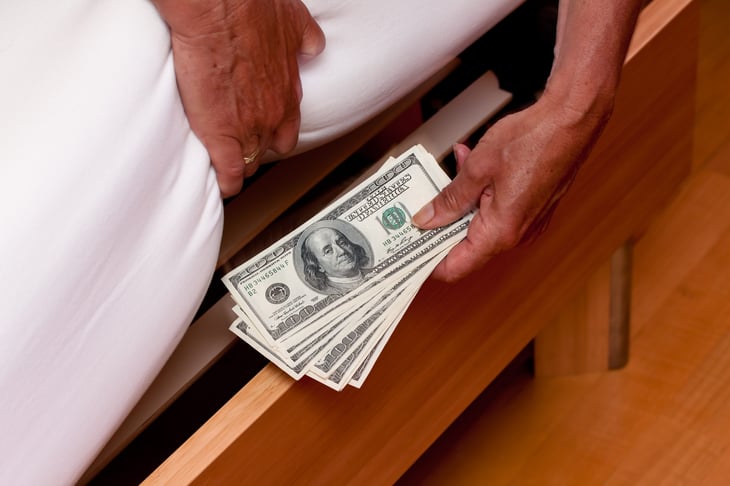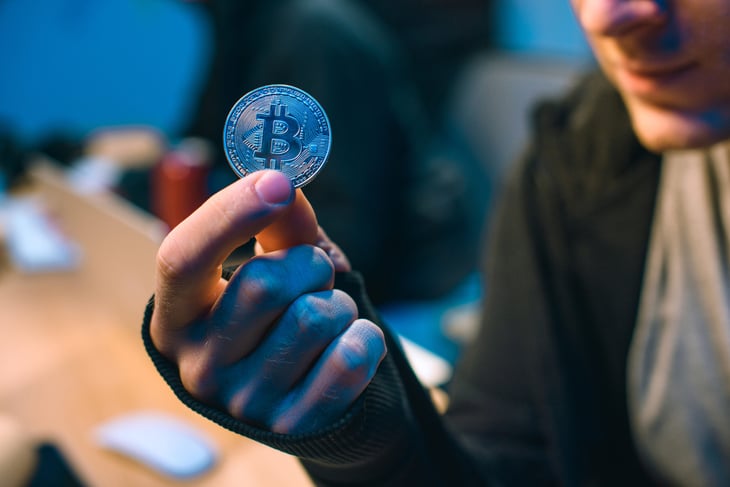
Your money is precious and learning how to guard and grow it is so important for reaching long-term financial goals.
There’s so much advice out there on where you should put your money. But what about where you shouldn’t?
We talked to industry experts so you can cut out the noise and know exactly where to avoid putting your cash savings.
1. Your checking account

Checking accounts are essential for covering expenses, but you shouldn’t be storing your money there.
Will Kellar, a certified financial planner (CFP), is a partner and lead advisor at wealth advisory firm Human Investing. He tells Money Talks News, “For investors, inflation is a silent killer that, if unchecked, can permanently deteriorate their purchasing power. To stress this, see how quickly your money can be cut in half based on different inflation rates.”
The annual inflation rate in January 2024 was 3.1%, but the average interest-checking account rate was 0.07% as of February.
So, if the bulk of your money is sitting in a checking account, you’re losing money — not gaining or even maintaining it.
You should have only one or two months’ worth of expenses in a checking account at a time, according to Rob Schultz, a CFP and senior partner of NWF Advisory Group.
2. Savings accounts at many major banks

Any money in your checking account that exceeds a couple months’ worth of necessities should go somewhere that’ll earn interest.
Traditional savings accounts with major banks, however, are not your ideal option.
“The additional savings should be in a high-yield savings account, whether it’s an online bank or credit union,” Schultz tells Money Talks News. “I would avoid the large bank savings accounts with uncompetitive yields,”
In February, the average interest rate for a traditional savings account was only 0.46%. However, several high-yield savings accounts have interest rates nearing 5% or more.
Not only do major banks often have less competitive rates, but they may have expensive junk fees too.
3. Your house

It may seem like a good idea to hide your money away from volatile markets by storing cash at home. It isn’t, though.
“Unfortunately, unbeknownst to many investors, cash is not as risk-free as it seems,” Kellar says. “Holding too much cash long-term can come at a high price.”
Money that sits under your mattress is depreciating just as it would in a checking account.
And that’s not the only downside.
Money that sits at home likely isn’t covered by insurance unlike cash kept at banks. So if something were to happen, such as a fire or theft, all of that money would be gone.
“[M]oney sitting in cash is losing purchasing power against inflation, especially in the inflation environment we’ve experienced over the last two years,” Matthew Benson, CFP and owner of Sonmore Financial, tells Money Talks News. “I’m not opposed to holding a couple thousand dollars at your home, but know how much it is, keep it in a fireproof safe, and know that you are not earning any interest on those dollars.”
4. CDs

Certificates of deposit, commonly called CDs, are stable but not ideal.
“The main reason traditional savings accounts and CDs are not optimal for long-term retirement savings for most people is that interest rates in these accounts have not outpaced inflation historically,” says David Flores Wilson, a CFP and managing partner at Sincerus Advisory.
The average CD interest rate as of February ranged between 0.23% and 1.83% depending on the CD’s term. These rates fall far behind the national inflation rate.
What’s more, any money you put in a CD can be inaccessible for months or even years. With these downsides in mind, you should be discerning when deciding how to make use of CDs.
“CDs could be used for more targeted expenses such as a property tax bill when you have a defined time for using the money,” Schultz says. “But I see people forgetting to roll them over, and then they get defaulted into a low-yielding savings account, negating the benefit.”
5. Alternative investments

There are many ways to invest outside a bank: cryptocurrencies, precious, metals, commodities, and so on.
None of the above are good options for savings.
“Again, if your intention is short-term savings, even using an investment account is not advisable as your holdings could lose value, leaving you not able to purchase the item you were saving for,” Benson says. “This would be especially true for crypto or commodities which are notorious for their extreme volatility.”
Crypto investments are exceptionally vulnerable to unpredictable and volatile markets, and there are plenty of fraudulent platforms out there.
Like crypto, investments in precious metals and commodities are at the mercy of the market.
Instead, consider Treasurys. They’re often safer and more profitable.
“If you have to hold cash, a favorable option in today’s market would be to buy U.S. Treasury Bills, which are yielding around 5% and also have the added benefit of being free of state income taxes,” Wilson says.





Add a Comment
Our Policy: We welcome relevant and respectful comments in order to foster healthy and informative discussions. All other comments may be removed. Comments with links are automatically held for moderation.